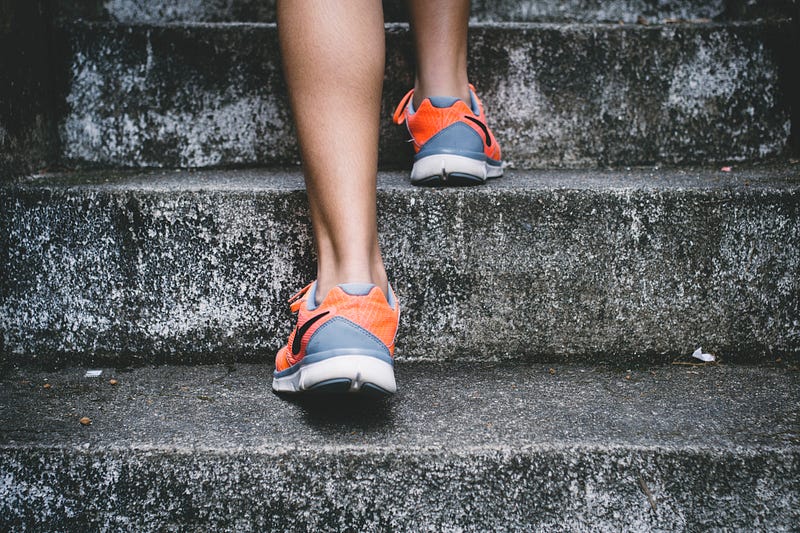[Day 2] It's not what you do, but how you do it
Photo by Marten Bjork on Unsplash H ave you ever seek out IELTS high scoring tips, to take solace in grasping every learning tactic,...

Have you ever seek out IELTS high scoring tips, to take solace in grasping every learning tactic, but hardly ever get down to work or perhaps better, quit after a few days?
Have you ever buy as many books as you can just for the sake of showing them off or perhaps better, stop at the very beginning and switch to read their brief or spoiler on the internet?
Have you ever promise to call your girlfriend/boyfriend 1 hour daily then forget about it, using busyness as an excuse.
“Winning is a habit. Unfortunately, so is losing.” ―Vince Lombardi
Well, creating a good habit isn’t easy. I, for example, have been too obsessed with it for years. Should I pin the blame on human nature, continually seeking out instant pleasure, that makes us procrastinators? By repeatedly saying so and doing nothing, sooner or later you would end up like those unreliable kids on the famous Marshmallow experiment, gradually losing ground in the long run. Conducted firstly by Walter Mischel and carried on by professors at Standford University, the research demonstrates that willpower is the primary condition for success, and in this situation, a new habit. However, to reach that end, we have to cope with three obstacles.
Small Wins
“All big things come from small beginnings. The seed of every habit is a single, tiny decision. But as that decision is repeated, a habit sprouts and grows stronger. Roots entrench themselves and branches grow. The task of breaking a bad habit is like uprooting a powerful oak within us. And the task of building a good habit is like cultivating a delicate flower one day at a time.”
― James Clear, Atomic Habits: An Easy & Proven Way to Build Good Habits & Break Bad Ones
Maintaining a string of new habit at a time is impossible. And forget about the new year’s resolution. We are all more than familiar with the typical wishes, say, getting up early, go to the gym three times per week, spend less time on Facebook, learn a new language, save more money, etc. All of these goals are tough nuts to crack and turns out you would g back to your old way since this is no overnight success story. Instead, consider the new month’s resolutions. You could only take one at a time, with a small step and accelerate day by day. It may sound cliche, and of course, you know it by heart. Well, many people talk the talk, but very few could walk the walk. Small changes you might not recognize in the first place, but as time goes by, they would grow on you then become part of your daily routine.

The cue
Rather, to change a habit, you must keep the old cue, and deliver the old reward, but insert a new routine. — Charles Duhigg
Our brain should always be stimulated by a trigger. Many people may tell you just to set a plan and do it right away, like shooting fish in a barrel. Nevertheless, studies showed that habits could only form when behavior is repeated in the existence of an environmental cue. If you have read The power of habit by Charles Duhigg, you must be so familiar with this term. Published recently, Atomic Habits by James Clear is another habit book, which is holding a special place in public affection. To be honest, I have never read those book; I’m planning to do it, also would give you an insight and comparison between them. According to James Clear, there are five primary ways that a new habit can be triggered, including time, location, preceding event, emotional state, and other people.
To be more specific, I would take an example of the location trigger. If all you desire now is to get up early at 6:00 am, you have to calculate the sleep time backward by minus the adequate length of your sleep (for me it’s about 6 hours), then you come to realize that you must force yourself to sleep by 12:00 pm. There are two types of trigger here, one that makes you awake, and the other helps you immediately falling asleep. Now it’s your turn, stay away from those distractions like your cellphone, laptop, and other media devices, as well as put all the sleep triggers surrounding you, say, a book, complete darkness, and meditation cushion (suit for me). The best choice is to have a cozy bedroom which is only big enough for a bed. In case you possess a multi-purpose bedroom, make sure you separate your room into spaces for different functions: sleeping, working, and studying.

The reward
Willpower isn’t just a skill. It’s a muscle, like the muscles in your arms or legs, and it gets tired as it works harder, so there’s less power left over for other things — Charles Duhigg
Oddly, our willpower is limited, like a fuel tank. We have to refill it from time to time, allow ourselves to be relaxed. Otherwise, once it is depleted, we may indulge ourselves in instant pastime. That’s why after a hard day’s work, you may find yourself at a bar/pub or just lay on the bed doing nothing but gluing the eyes on Youtube, Facebook, or Instagram. But the good news is that you can stretch your willpower muscle, enlarge your fuel tank so that you could happily repeat your day-to-day tasks without getting bored. Given that those tedious tasks have been automatically written in your fast thinking system. In other words, you are raising your “ego depletion.” So below are a few steps on how to improve your willpower muscle:
- First, you have to know your current level. At the same time, you must train your willpower muscle at a slightly higher level.
- By setting small steps with rewards whenever you achieve a target, you are luring your mind that it’s no great trick whatsoever.
- Remember to gradually raise your own bar as your willpower improves over time.
- It’s okay to feel tired sometimes. It’s okay for not being in a mood sometimes. This happens to most of us now and then. All I can tell you is let’s spend time with your loved ones, indulge yourself a little bit in music, comfort food, and perhaps change your routine if it doesn’t fit you.

Did you find some great strategies of your own in this article? What are the exciting ideas forming your own habits — and how are you implementing them? Let me know in the comments.

Kỹ năng
/ky-nang
Bài viết nổi bật khác
- Hot nhất
- Mới nhất